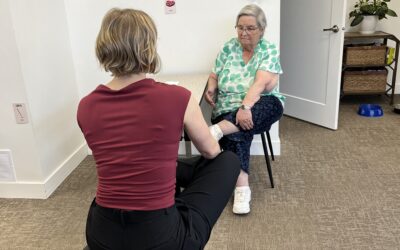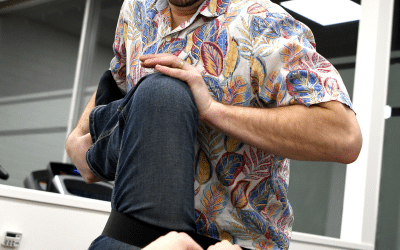Concussion Rehabilitation
What is a Concussion?
A concussion is a traumatic brain injury. It can occur from a direct impact to your head, or by an indirect cause (like whiplash) where your head does not come in contact with anything. Most of the time, individuals who experience a mild to moderate concussion with fully recovery within one month. Sometimes though, symptoms can persist much longer.
Concussions can be a serious injury, and they can have a significant impact on a person’s physical and cognitive function. At Altea Physiotherapy + Wellness, we understand the unique challenges of concussion rehabilitation, and we are committed to helping our patients achieve a safe and effective recovery.
Our concussion rehabilitation program is designed to be holistic and personalized, taking into account the specific needs and goals of each patient. We use a variety of evidence-based techniques and therapies to help manage the symptoms of a concussion and promote optimal physical and cognitive function.
Concussion rehab may involve a variety of therapies, including vestibular therapy, visual therapy, cognitive therapy, and physical therapy. We also offer a range of other services that may be beneficial in managing the symptoms of a concussion, such as relaxation massage and acupuncture.
Our team of experienced professionals is dedicated to providing comprehensive and compassionate care to our patients throughout the concussion rehabilitation process. We work closely with our patients to develop a customized treatment plan that is tailored to their specific needs and goals, and we provide ongoing support and guidance to ensure a safe and effective recovery.
Concussion Rehabilitation
What Can Concussion Rehabilitation Help With?
- Fatigue
- Trouble Sleeping, or Sleeping Too Much
- Headaches
- Dizziness
- Anxiety
- Depression
- Quick/Easy to Anger
- Changes in Personality
- Difficulty Finding the Right Words
- Nausea and Vomiting
- Noise and Light Sensitivity
- Difficulty Navigating in Busy Environments
- Confusion
First time to Altea?
What To Expect During A Concussion Rehabilitation Assessment
Your concussion rehabilitation assessment will take 60 minutes, and you’ll work with one of Altea’s physiotherapists specializing in the treatment of concussions.
The assessment will be designed to evaluate your condition, review your medical history, and discuss your symptoms and treatment goals with you. Your physiotherapist may ask you questions about your concussion, including how it happened and what symptoms you are experiencing. You’ll also be taken through tests to assess certain systems in your body that can be affected from a concussion. These systems include your visual, vestibular, and autonomic system (controls heart rate and blood pressure). Your physiotherapist may also use specialized equipment to evaluate your balance, coordination, and vision.
Based on the results of the assessment, your physiotherapist will work with you to develop a customized treatment plan that is tailored to your specific needs and goals. This may involve a variety of direct therapies and strategies, such as vestibular therapy and physical therapy. We may also recommend other services that may be beneficial in managing the symptoms of a concussion, such as relaxation massage and acupuncture.
Your physiotherapist will also provide you with guidance on how to manage your symptoms at home and may recommend lifestyle changes or modifications to your daily activities to promote a safe and effective recovery.
Throughout the concussion rehabilitation process, your physiotherapist will provide ongoing support and guidance to help you achieve a safe and effective recovery and get back to your normal activities and the things you love.
FAQ
Frequently Asked Concussion Rehabilitation Questions
Q: What is a concussion?
A: A concussion is a type of traumatic brain injury that can result from a blow to the head or a sudden jolt or impact. Concussions can cause a wide range of symptoms, including headaches, dizziness, nausea, confusion, and cognitive difficulties.
Q: What are the 4 steps of recovering from a concussion?
A: Recovery from a concussion typically involves four key steps:
1. Evaluation: The first step in concussion recovery is to receive a thorough evaluation from a healthcare provider. This evaluation may include a physical exam, cognitive testing, and other assessments to determine the severity of the concussion and develop a customized treatment plan.
2. Rest: Rest is a critical component of concussion recovery, as it allows the brain to heal and reduces the risk of further injury. Rest may involve avoiding physical activity, limiting screen time, and avoiding activities that require concentration or memory.
3. Rehabilitation: Rehabilitation is a key component of concussion recovery, as it can help to improve physical and cognitive function and reduce the severity of symptoms. Rehabilitation may involve a variety of techniques, such as vestibular therapy, visual therapy, cognitive therapy, and physical therapy. The goal of rehabilitation is to help the patient return to their normal activities as safely and effectively as possible.
4. Gradual Return to Activities: The final step in concussion recovery is a gradual return to normal activities. This may involve a step-by-step process, starting with light activity and gradually increasing the intensity and duration of physical and cognitive activities. The patient will need to be cleared by a healthcare provider before returning to high-risk activities, such as contact sports.
It’s important to note that the specific steps of concussion recovery can vary depending on the severity of the injury and the individual needs of the patient. It’s important to work with a healthcare provider to develop a customized concussion recovery plan that is tailored to your specific needs and goals. With the right approach, many people are able to successfully recover from a concussion and return to their normal activities.
Q: How do you rehabilitate a concussion?
A: Rehabilitation of a concussion typically involves a multidisciplinary approach that addresses the physical, cognitive, and emotional aspects of the injury. Depending on the severity of the concussion and the individual needs of the patient, rehabilitation may involve a range of therapies and techniques.
Q: What are 2 treatment options for a concussion?
A: There are a variety of treatment options for a concussion, and the specific approach will depend on the severity of the injury and the individual needs of the patient. Here are some treatment options that may be recommended:
1. Rest: Rest is a critical component of concussion treatment, as it allows the brain to heal and reduces the risk of further injury. Rest may involve avoiding physical activity, limiting screen time, and avoiding activities that require concentration or memory.
2. Rehabilitation: Rehabilitation is an important part of concussion treatment, as it can help to improve physical and cognitive function and reduce the severity of symptoms. Rehabilitation may involve a range of therapies and techniques, including vestibular therapy, visual therapy, cognitive therapy, and physical therapy.
Q: How can physiotherapy help with concussion rehabilitation?
A: Physiotherapy can be an effective approach to concussion rehabilitation, as it can help to improve physical function and alleviate many of the symptoms associated with concussions. Physiotherapy may involve a range of therapies and techniques, including vestibular therapy, visual therapy, cognitive therapy, and physical therapy.
Q: How long does concussion rehabilitation take?
A: The length of time it takes to recover from a concussion can vary depending on a variety of factors, including the severity of the concussion, the age of the patient, and the effectiveness of the treatment. In general, concussion rehabilitation can take several weeks or months, and it may involve a gradual return to normal activities.
Q: How long does it take for your brain to fully heal after a concussion?
A: The time it takes for the brain to fully heal after a concussion can vary depending on the severity of the injury and the individual needs of the patient. While some people may recover within a few days or weeks, others may experience symptoms for several months or even years.
In general, it’s important to take a gradual and cautious approach to returning to activities after a concussion. Rushing the recovery process can increase the risk of further injury or exacerbate symptoms.
It’s also important to note that some people may experience long-term effects from a concussion, such as headaches, memory problems, or difficulty concentrating. In these cases, ongoing treatment and management may be necessary to help manage symptoms and improve quality of life.
If you have experienced a concussion or suspect that you may have, it’s important to seek medical attention right away.
Q: What not to do with concussion?
A: There are several things that you may need to consider if you have a concussion, as certain activities may increase the risk of further injury or worsen your symptoms. We’ll discuss some of these considerations during your treatment with us, but it’s highly recommended that you consult a healthcare professional for complete guidance.
Above all, don’t ignore your symptoms. Be aware of the signs of a concussion and seek medical attention right away if you experience any of these symptoms. Ignoring symptoms can increase the risk of further injury or complications.
Q: How can I manage the symptoms of a concussion at home?
A: Your healthcare provider may provide you with guidance on how to manage the symptoms of a concussion at home. This may include rest, relaxation techniques, avoiding activities that worsen symptoms, and gradually returning to normal activities..
Q: Can concussions be prevented?
A: Concussions can be difficult to prevent entirely, but there are certain strategies that can help reduce the risk of concussion. These may include wearing protective gear during high-risk activities, avoiding head impacts, and practicing safe driving habits.


